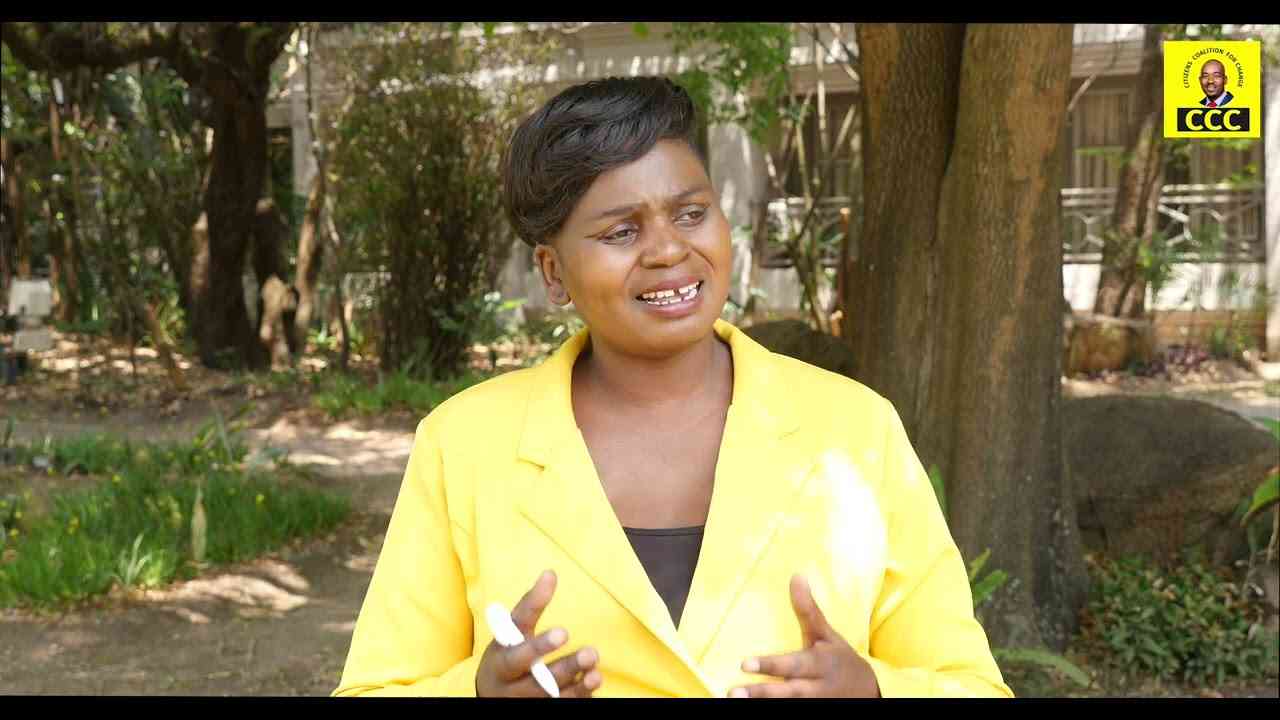Shiriyedenga tears ZEC’s 2023 Election Report, it lacks the quantitative aspect #ElectionsZW
Citizens Coalition for Change legislator Ellen Shiriyedenga has castigated the 2023 Election Report arguing that it did not present statistical data on results but only listed names of winning candidates.
According to Shiriyedenga, in previous elections, ZEC would give a report which would indicate results down to the polling station.
She said this would help to identify and verify how many people voted for this presidential, parliamentary, or local authority candidate in a particular ward.
Adding her voice to the 2023 Election Report in the National Assembly, the legislator said what was tabled is not helpful in terms of ascertaining the verifiability of any election.
Below is Honourable Shiriyenga’s full debate in the National Assembly (Courtesy of Parliament Hansard):
Honourable Ellen Shiriyedenga: Let me start by thanking ZEC for tabling the report and also taking into cognisance that the report has been submitted within the stipulated six months allowable period by our electoral laws. I would like to appreciate that the report speaks to the basic tenets as highlighted in our electoral cycle which I think ZEC did speak to. In terms of my debate, I would want to focus with respect to the mandate of ZEC as espoused in Section 239 of our Constitution and also in looking at Section 156 (a) which requires that any electoral system should adhere to the basic principles which are simplicity, accuracy, verifiability, security and transparency.
In that regard, starting off with ZEC’s Chairperson, she highlighted that the elections were conducted in an environment informed by the 2018 election review changes in the legal environment. Indeed, we had a cocktail of recommendations in 2018 on electoral reforms. Actually, we had 223 of them and these reforms bordered around political, legislative and administrative reforms. However, of concern is the fact that only just a minimum, not even a third of those reforms were implemented.
First and foremost, we are looking at the constitutional reforms that we adopted during this electoral period, particularly Constitutional Amendment No. 2 which mainly focused in terms of increasing representation of women, youth and also the repealing of the running mate clause. Of course, we do appreciate the increase in the number of youth and women in Parliament. However, if you get to explore the mandate of ZEC as espoused in Section 239 and Section 156 (a), you will realise that those constitutional reforms do not have an impact in terms of ensuring the freeness, fairness and credibility of the election and also the five tenets which I spoke to earlier on. Yes, we can celebrate the reforms but those reforms were inadequate.
Further, we have the Electoral Amendment Bill which was presented before this House. Unfortunately, given what our Constitution says, any amendment to the electoral law cannot be effected after the proclamation. The challenge thereof is that that the election proclamation was made whilst the Electoral Amendment Bill was been debated. Clearly, this resulted in a situation where there were no electoral amendments to our electoral law and that presented challenges.
Also, going back to those Election Observer Mission recommendations, yes, we might say that we do not care about them, but as a country, we have regional and international commitments that we are accented to. For example, we speak of the SADC Principles and Guidelines Governing Domestic Elections, we are a signatory to that. This is why even this report, it would have been prudent for ZEC to attach the Election Observer Report as addendums to this report –
In terms of our interactions with ZEC, ZEC has always said that it does not have powers to effect any changes to the law, but going by Section 192 of our Constitution, we realise that ZEC has the powers to effect administrative amendments to the law. It used that example when it increased the nomination fees and also the prices for the voters’ roll. That was the administrative power which ZEC executed, but we did not see ZEC exercising that power in terms of ensuring the freeness, peacefulness and credibility of the election.
I say that for example, ZEC has the capacity to foster changes to the Electoral Code of Conduct to ensure that elections are conducted in a peaceful environment which adheres to the requirements of our Constitution, but that was not done, even the issue of consulting stakeholders on pertinent issues. It is part of the administrative power which ZEC has, but that was not done and is also not even included in the report which has been tabled before us. So really, it is my feeling that ZEC did not exercise its administrative powers as enshrined in the Constitution.
The other issue which I noted, this report is mainly qualitative and lacks the quantitative aspect which relates to the verifiability and accuracy of this election. I say so looking at the statistical data which has been presented. In the previous electoral circles, ZEC would give us a report which will indicate results even down to the polling station. We were able to identify and say at this particular ward, how many people voted for this presidential or parliamentary or local authority candidate, but this time around nothing of that sort is in this report. What we note is the fact that ZEC only lists the names of the winning candidates and that is not helpful in terms of ascertaining the verifiability of any election.
Going on to the issue of voter registration, yes, we had voter registration period and also people were given the opportunity to register, which was good. ZEC was exercising its mandate as highlighted in the report, but looking at the basic principle of universal suffrage as enshrined in Section 67 of our Constitution and also Section 155 where ZEC is obliged to adopt all appropriate measures including legislative to ensure that every eligible citizen utilises that right, we are seeing a situation whereby we have disfranchised members of our community that were accorded the opportunity to register as voter, or more-so to even vote on election day.
In that respect, I speak to the diaspora community. We have over three million Zimbabweans out there. You look at Section 67 for example, it is clear to say that every citizen of Zimbabwe above the age of 18 has the right to vote, but we see disfranchisement of that community. More-so, we have other communities that were also left out. Speaking of prisoners for example, we have a very huge population of prisoners. There were no any initiatives you know, even any discussions to accord those persons their right to vote.
We have persons with disabilities. What measures were put in place to ensure that all persons with various aspects of disabilities were given their right to register as voters and vote on election day? We have a critical constituent which has been neglected, the civil servants that will be on duty on election day. No measures were put for them to vote on election day. So these are some of the issues that ZEC should have addressed. My debate focuses mainly on the electoral circle. The processes that culminated to election day.
Also, on the voters roll like I indicated earlier; this report is devoid of the critical statistical data. ZEC had no detail of the people that were removed or added on the voters’ roll
Also tied to the statistical deficiencies, we look at the voters’ roll data and also the list of polling stations that were gazetted. In the previous election circles, what ZEC would do is, they would give us polling station data, the breakdown at each and every polling station in terms of gender, but this time we do not have that data. You can check in the report, nothing of that sort has been given. So, it becomes problematic in terms of verifying, for example, the voter turnout on election day vis-a-vis the voter population data that would have been brought before us by ZEC. I strongly feel that ZEC should have availed more detailed information in that respect.
Also, on the issue of the voters’ roll, ZEC did adhere to its statutory requirements by giving candidates the voters’ roll, but it is the timing of making sure the voters’ roll was available. I know of one presidential candidate for the CCC Party. He got his voters’ roll on the 10th July which was just over a month away from the election. Further to that, the formatting of the voters’ roll did not respect the Electoral Act requirements. The Electoral Act is very clear to say that the voters’ roll should be given to any candidate or stakeholder. It should be in a format which is verifiable and searchable.
If you are to look at the voters’ rolls that were given to candidates, they were in a PDF format which was highly encrypted. We all know that PDF is for read only purposes. How do you analyse or search a PDF file of which I felt ZEC did not adhere to the prescriptions of the Electoral Act in that regard? Of note also, if you can recall Madam Speaker, in this electoral circle, we had the delimitation exercise. The delimitation report was gazetted on the 23rd February, 2023. The delimitation report did not specifically name the polling stations. Instead, it used polling station codes of which stakeholders had problems in terms of identifying the specific polling station. The irony of the voters’ roll which was given to candidates is that the polling station codes were then removed.
If you look at polling station codes, the irony is that the final voters’ roll that was given to candidates did not have those polling station codes. At the end of the day, it becomes difficult to actually compare what was encompassed in the delimitation report vis-à-vis the voters’ roll that was given to candidates. With regards to that, there is a problem.
On the issue of assisted voters, the Presiding Officer is obliged to name every voter in terms of the law and the reason why that person has been assisted. But to date, we do not have the statistics as to how many voters were assisted. We have a case for example, where in one polling station we had over 200 assisted voters. A country like Zimbabwe which has a highly educated population, that in itself leaves a lot of scrutiny.
In terms of recommendations, I think it is prudent that ZEC adopts the recommendations from election observer missions and we start debating on those recommendations as stakeholders; looking at ZEC in terms of Section 239 and review on the process issues as to how it fared with respect to its mandate vis-à-vis the reality on the ground – at the end of the day, an election which is devoid of those free, fair and credible principles becomes an election which has doubts.
Shiriyedenga tears ZEC’s 2023 Election Report, it lacks the quantitative aspect



